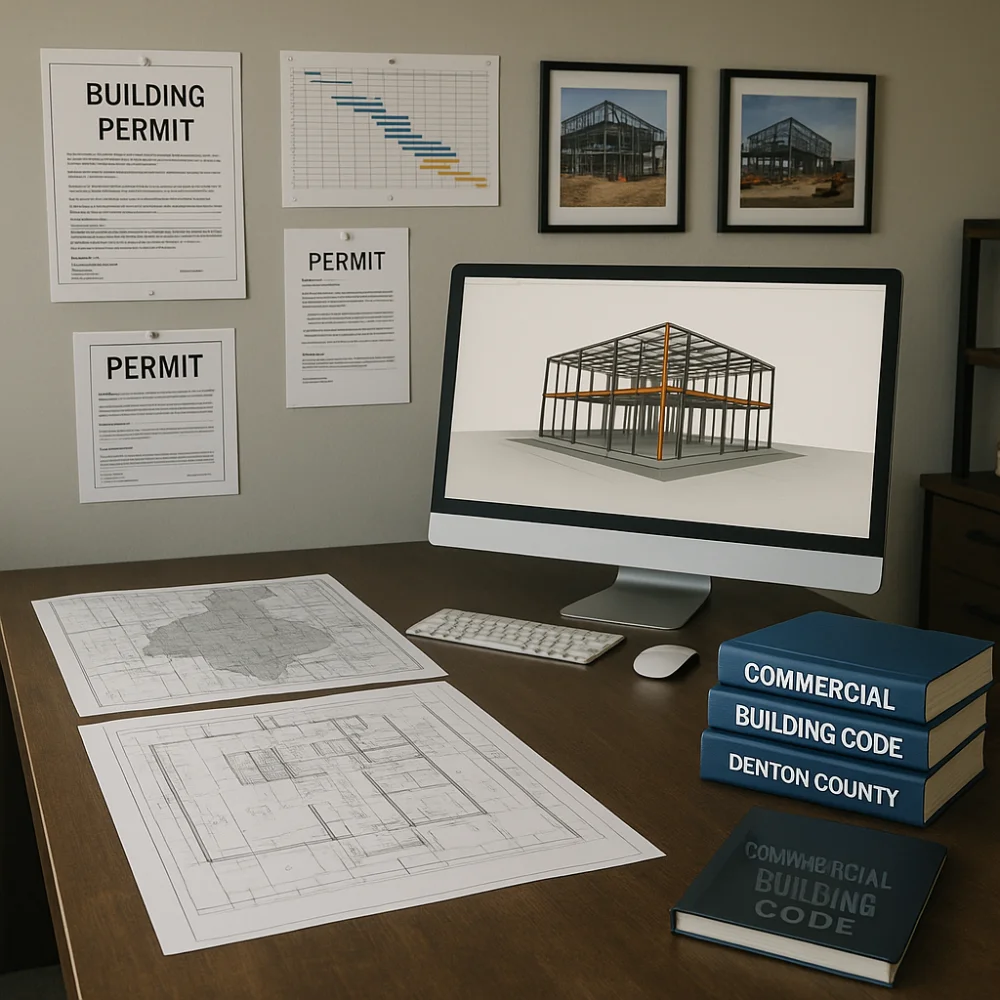
Denton County's commercial construction market supports retail, healthcare, industrial, and office projects with end‑to‑end services from preconstruction through final execution. Local firms provide design‑build, value management, specialized knowledge, and specialty trades coordination. Metal building suppliers deliver engineered steel systems, prefabricated components, and custom architectural metalwork. Health and hospital projects demand advanced MEP and life‑safety compliance. Industrial and warehouse work includes tilt‑wall and high‑clearance distribution centers. Further sections outline permitting, contractor selection, and market drivers today.
Although Denton County remains a suburban market, it registered roughly $670 million in commercial construction starts in Q1 2025, contributing to the Dallas–Fort Worth region's $6.9 billion quarter. Denton's market shows sustained expansion driven by population and corporate growth, with office inventory under construction at 33,528 square feet and notable completed projects such as 3312 Teasley Lane.
Permit activity rose to 150 year-to-date in FY22/23 from 62 in 2022, reflecting accelerating development. Mixed use development has attracted significant investment alongside medical and retail facilities, while institutional investors target stable suburban submarkets.
Strategic locations in Denton and neighboring Collin counties account for a large share of regional demand, positioning the county for tighter vacancies and rent recovery into 2025–2026 and sustaining developer confidence through 2026.
Commercial contractors in Denton County handle a range of project types, from retail and restaurant buildouts to complex healthcare facilities and large-scale industrial and warehouse developments.
Retail and food service projects require fast turnarounds, local permitting knowledge, and coordination of specialty trades for commercial kitchens and storefront systems.
Healthcare and industrial work demand strict code compliance, specialized systems integration, and flexible site planning for logistics and multi-tenant configurations. EastGroup is developing a 244,000-square-foot Class A industrial complex in the northwest DFW submarket.
Many projects — from single storefront renovations to multi-level shopping centers and full-service restaurant fit-outs — require specialized build-outs that balance customer experience, operational workflow, and code compliance. Common commercial build-outs include retail, office, restaurant, medical, and fitness projects, each with distinct requirements; Retail and Restaurant often require extensive coordination.
Retail and restaurant buildouts in Denton County focus on efficient circulation, brand consistency, and regulatory adherence, with build out budgets set early to guide scope and materials. Tenant coordination guarantees corporate guidelines, lease provisions, and phased access are managed alongside planners, engineers, and contractors.
Retail work emphasizes sightlines, merchandising zones, and traffic flow; restaurant projects add commercial kitchens, ventilation, refrigeration, bar areas, and sanitation that meet state codes and OSHA standards.
Renovations, tenant improvements, and custom design elements are planned to optimize repeat business, staff efficiency, and long-term maintainability within existing commercial shells and simplified ongoing maintenance strategies.
In Denton County, healthcare facility construction encompasses hospital expansions, specialized medical centers, educational health science buildings, and inpatient rehabilitation hospitals, each demanding higher mechanical, electrical, and life‑safety standards than typical tenant fit‑outs. The project also included a 160,000-square-foot building. Recent projects include Texas Health Presbyterian Hospital Denton's $128 million expansion, growing from 160,000 to 215,000 square feet, adding ten ED beds and expanded OB/NICU capacity, and a new breast center and surgical suites.
Texas Woman's University broke ground on a $107 million, 136,000‑square‑foot health sciences center. A Lifepoint–Texas Health inpatient rehabilitation hospital is planned with 40 private rooms. Total investment tops $260 million.
Contractors used prefabrication, underground central utility plant rack installation, and schedule mitigation to address labor shortage impact and accommodate specialized medical equipment and regulatory requirements.
Although driven largely by rising logistics demand, Denton County's industrial and warehouse development spans tilt‑wall office/warehouse buildings, high‑clearance distribution centers, and expansive business parks positioned at the convergence of I‑35E, I‑35W, and US‑380 to serve major users such as Target, ALDI, MillerCoors, CEVA, Tyson Foods, and Peterbilt.
Projects range from Denton Westpark's 112,310 and 130,068 SF tilt‑wall buildings to I‑35 Convergence @ Denton Building 1 with 250,080 SF and 32' clear height. Emphasis on substantial infrastructure development supports access to Denton Enterprise Airport, spacious truck courts, lighting, ESFR sprinklers, and metal frames. Engineering teams deliver wind and foundation calculations and layouts to enable specialized warehousing features for expansion.
Contractors in Denton County supply complete steel building systems and custom metal fabrication for garages, barns, warehouses, and residential steel structures.
They pair reflective insulation and durable cladding options with galvanized, American-made steel to satisfy energy, fire safety, and longevity requirements.
These services are integrated with structural engineering, prefabrication, and installation workflows to guarantee code compliance and efficient project delivery.
Steel building systems in Denton County combine factory-prefabricated components with engineered custom designs to deliver fast, durable commercial, industrial, and agricultural structures. Providers employ prefab construction methods and pre engineered metal building design to create clear-span warehouses, barns, hangars, and retail shells.
Factory-cut, welded, and drilled framing arrives marked for bolt-together assembly, cutting onsite labor and schedules by up to 33%. Options range from 12' to 150' widths and DIY kits to professional erector installation. Structural specifications meet regional wind, snow, and seismic codes for long-term performance. Manufacturers and local firms coordinate delivery, permitting, and erection services efficiently locally.
Although project requirements vary, Denton County's custom metal fabrication sector delivers personalized solutions across structural, agricultural, and industrial projects. A network of 75 verified contractors supports bespoke architectural metal work—metal wall panels, chimney caps, gutters, facade panels, awnings, siding and custom metal roofing systems—plus historical restoration matching.
Agricultural specialists produce barns, arenas, stalls and hay storage with full specification customization for farm and ranch needs. Industrial providers offer engineered steel warehouses with structural analysis, cost-optimized steel frames and material handling layouts.
Thornton Steel and BAC Fabrication supply heavy structural and advanced roofing components, while Alpine Sheet Metal Systems fabricates tight-tolerance roofing parts. In-house design and engineering teams guarantee code-compliant plans, detailed drafting, and consultative services, consolidating specialty metal fabrication services for durable, project-specific results.
Insulation and cladding systems in Denton County combine spray foam, blown-in cellulose, roof insulation assemblies, and specialty coatings to deliver airtight, moisture-resistant envelopes that cut air leakage and energy loss by as much as 40%.
Contractors apply SPF for walls, roofs, and attics to seal gaps, strengthen structure, and reduce HVAC load; blown-in cellulose offers recycled-material thermal and acoustic performance supporting sustainable building practices.
Commercial roof insulation assemblies limit condensation, thermal transfer, and CO2 footprint while improving fire rating. Polyurea and other specialty coatings protect membranes and extend service life, enabling energy efficient applications across metal building and specialty construction projects.
When pursuing commercial construction in Denton County, developers must obtain multiple coordinated approvals—beginning with a Site Plan application through the Planning Department and a Development Permit from Public Works (which must include a 911 address) before any building permit can be accepted. Review procedures require two printed sets and one electronic copy; plans review takes up to ten working days and first-round comments must be addressed prior to building permit submission.
Registered design professionals must stamp plans; electronic submission via eTRAKiT is available. Projects need Construction Permit from the Fire Marshal and fire system reviews. Special Use Permits may be required for warehouse or manufacturing uses with owner notifications and zoning variances considered under local regulations.
Additional permits include culvert, septic, and trailer permits.
Effective pre-construction planning and construction management align feasibility, design, regulatory compliance, risk mitigation, and logistics to establish a clear roadmap before ground is broken. A thorough feasibility analysis evaluates site, soil, utilities, zoning and market viability while coordinating engineering disciplines to produce construction documents.
Risk analysis, safety planning and schedule sequencing reduce change orders and delays. Early procurement strategies support project financing and transparent contract negotiation to secure contractors and vendors. Coordination continues through mobilization, permitting milestones and timeline management to maintain budget and sequence. The process emphasizes cost control, schedule adherence and regulatory documentation for predictable delivery outcomes.
Multiple indicators point to sustained commercial construction demand in Denton, driven by vigorous demographic growth, corporate relocations to the DFW periphery, and a sizable pipeline of mixed-use developments. Denton recorded about $670 million in project starts in Q1 2025 and maintains $682.2 million underway across 86 projects, including Landmark and Cole Ranch dominant plans totaling thousands of acres and millions of square feet.
Retail anchors such as H-E-B and active office starts reflect tenant interest despite a 13.98% vacancy rate. Regional momentum in DFW — with $6.9 billion initiated and rising rents — supports local investment. Developers absorb infrastructure costs while municipalities harness government incentives.
Continued population influx and improving workforce availability sustain demand for office, retail, industrial, and mixed-use construction over the decade.
With Denton's booming pipeline and larger-scale mixed-use projects underway, selecting the right commercial contractor becomes a decisive factor in project outcome. The selection process emphasizes verified licensing, insurance, bonding capacity and relevant commercial experience.
Review portfolios, certifications (OSHA, LEED) and association membership for credibility. Evaluate financial stability to avoid delays and guarantee subcontractor payment. Assess communication, detailed bids and project timeline management to confirm expectations.
A disciplined selection reduces risk and improves likelihood of on-budget, on-time delivery. Owners should request references and directly verify recent project outcomes.
In Denton County, successful commercial construction depends on experienced local partners who understand the region’s regulatory environment and the practical realities of building. Projects range from industrial facilities and adaptive retail spaces to sustainable builds, and each demands solid pre-construction planning, reliable metalwork and trade coordination, and proactive permitting navigation to keep schedules and budgets realistic.
Owners and project teams should prioritize contractors with verifiable credentials, deep local knowledge, and strong construction management skills — firms that emphasize craftsmanship, clear communication, and collaborative problem-solving over flashy promises. Market trends such as industrial growth, retail adaptation, and increasing sustainability expectations will continue to influence timelines and cost planning, so choosing a team that reads those signals and responds with practical solutions is critical.
For project owners seeking a dependable local partner, TriStar Built is a Denton County–based, locally owned and insured construction company known for a quality-first approach, long-term subcontractor relationships, and client-focused service.
Denton County businesses rely on a full spectrum of services, including preconstruction planning, design-build delivery, general contracting, site development and grading, industrial and warehouse builds, healthcare facility construction, metal building systems, and prefabricated component installation. Whether you're converting a space for retail, building a hospital wing, or erecting a high-clearance warehouse, these local services are tailored to meet regulatory, scheduling, and budget demands effectively.
The commercial sector is growing steadily—with $670 million in new construction starts recorded in Q1 2025, contributing to the DFW metro’s $6.9 billion first-quarter total. Industrial demand is especially robust: industrial square footage has surged from around 220,000 to 4.2 million square feet in recent years, while vacancy rates have decreased from 18.6% to 16.6%. Mixed-use developments, healthcare facilities, and retail expansion further enhance economic momentum.
Local firms supply engineered steel building systems and custom metal fabrication ideal for quick, robust commercial shells, hangars, and warehouses. Prefab steel frames—machined with precision—can speed up on-site assembly by roughly 33% and ensure compliance with local structural codes. These durable systems offer both flexibility and long-term resilience for businesses.
Healthcare builds like hospital expansions and labs must meet strict MEP (mechanical, electrical, plumbing) and life-safety standards, often using prefabrication and utility plant integration to manage complexity and labor constraints. Industrial sites—such as high-clearance distribution centers—require tilt-wall construction, robust infrastructure for trucks, and compliant site engineering to support logistics and operations efficiently.
Prioritize contractors with proven local experience, strong portfolios, and solid credentials (licensing, bonding, OSHA or LEED certifications). Key firms in the area offer comprehensive services from preconstruction to execution. Evaluate their planning practices, communication clarity, and ability to navigate local permitting and specialty trade coordination.

Whether you’re remodeling a home, expanding a business, or starting from the ground up, TriStar Built is here to guide you every step of the way. With a focus on craftsmanship, communication, and results that last, we make the construction process clear, smooth, and worth every investment.

LOCATION: 2126 James Street, Denton, TX 76205
PHONE: (940) 381-2222
© 2025 TRISTAR BUILT - ALL RIGHTS RESERVED | WEB DESIGN & SEO BY: Authority Solutions®